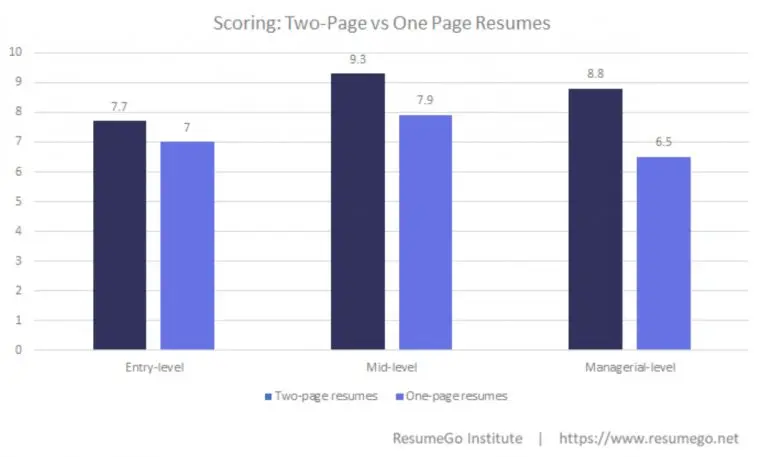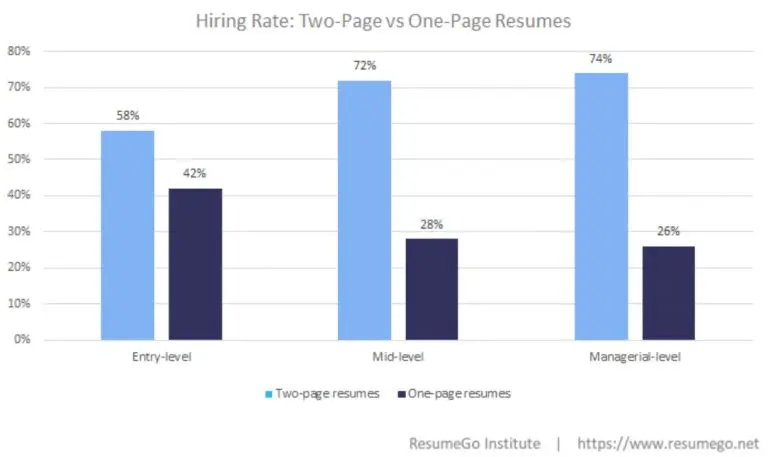Until you’ve reached the mid-point of your career, or unless you’re in a unique industry like academia or medicine, your resume should always be one-page long, right?
Maybe not.
Despite the long-held convention, a recent study has found that two-page resumes are actually preferred by recruiters, no matter the candidate’s experience level. The study, conducted by resume writing service ResumeGo, found that compared with single-page resumes, two-page resumes increase the amount of time recruiters spend reviewing the applicant, and can ultimately improve the candidate’s likelihood of getting hired.
ResumeGo asked 482 recruiters, hiring managers and HR professionals to screen nearly 8,000 resumes in a hiring simulation, over 5,000 of which used at least part of a second page. The study concluded that recruiters were 2.3 times as likely to prefer two-page resumes, scoring their ability to “summarize the candidate’s work experiences and overall credentials” higher by an average of 21%. Furthermore, when it came time to make a final decision, participants spent an average of more than four minutes reviewing two-page resumes, compared with less than two and a half minutes on those that were confined to one.

“We were pretty surprised ourselves,” says Peter Yang, the CEO of ResumeGo. Yang says that after seeing candidates whittle their resumes down to a single page by increasing the margins, reducing the font size and even removing some potentially relevant information, he decided to test the conventional wisdom that forbids page two. “I think that belief wasn’t actually grounded in any scientific data or research, and I’m not sure how it came about,” he says.
Yang adds that if a resume doesn’t require two pages, job seekers shouldn’t take his study to suggest they need to add more information just for the sake of reaching the second page. “It would come across as unnatural,” he says. “It would seem clear to the reader that you’re just adding in fluff.”
The study ultimately found that employers were 2.9 times more likely to prefer a two-page resume when hiring for managerial positions, 2.6 times as likely to prefer them for mid-level positions, and 1.4 times as likely to prefer a two-page resume for entry-level job openings.
Don’t go over the cliff
Similar research conducted by AI-driven resume optimization and job search platform TalentWorks found that interview rates slowly increase along with word count, until sharply dropping around the 600 mark.
“For almost everyone, your hireability drops off a cliff if your resume is too long,” saysTalentWorks CEO Kushal Chakrabarti. Despite the sharp decline in interview rates for those that go overboard, reaching the 600-word target would still necessitate a second page; especially a resume page that’s been formatted to not appear cluttered.

Some industries, however, expect their applicants to go well beyond the 600-word threshold. “Longer is better if you’re an academic, industrial scientist, college professor, school teacher, or social service worker,” says Chakrabarti, adding that some industries also punish longer resumes more harshly than others. “For example, in business, long resumes were a whopping 72% less hireable than those in the sweet spot [of 600 words].”
A new standard for a new generation
It’s hard to say exactly when two-page resumes became socially acceptable or even preferable, but experts point to a number of trends that have slowly made them the norm. For example, despite the stereotype, many younger and entry-level employees actually have more of a story to tell on their resumes than their parents and grandparents did when they entered the workforce: enough to necessitate a second page.
“With more recent graduates, compared to 10 years ago, there’s more of a focus on internships while they’re in school, they’re doing study abroad programs, working part time, volunteering, or working on a political campaign,” said Monster career expert Vicki Salemi. “Perhaps recruiters want to know more about these experiences that they’re having because there’s more opportunities [outside of academia] now.”
On the other side of the hiring equation, the way in which resumes are evaluated today is dramatically different than in previous generations, explains Salemi. Applicant tracking systems have automated much of the initial vetting phase, and there’s an inherent advantage in giving keyword-searching robots a little extra text to scour.
The incorporation of this technology also means that recruiters rarely handle printed resumes before the interview stage. While printing and reviewing a second, physical page may have once been considered a nuisance, scrolling down a digital page hardly requires any additional effort.”With everything being online it’s just a matter of scrolling down and looking for those keywords,” says Salemi.
The top of the first page is still most important
Though the ResumeGo study suggests that job seekers at all levels can now feel comfortable using a second resume page it’s important to keep the most relevant information front and center.
According to that study recruiters will spend an average of 2 minutes, 24 seconds reviewing one-page resumes and 4 minutes, 5 seconds reviewing two-page resumes, but only when they’ve narrowed their decision down to their final contenders. An oft-quoted 2012 study conducted by Ladders, Inc. found that hiring managers only spend an average of 6 seconds deciding whether to give a resume further consideration, and a follow-up study recently updated that time to 7.4 seconds.
“Six seconds, or 7.4 seconds, is just that initial glance, where I’m looking for where they went to school, what degree they have, what they’ve been doing most recently, how long they’ve been there, are they employed right now; there’s about six pieces of information we’re checking out,” explained Amanda Augustine, a career advice expert at professional resume writing service TopResume. In 2012 Augustine served as a career management expert and spokesperson for Ladders, where she contributed to that foundational research. “As soon as they get it down to a manageable number [of resumes] where they feel comfortable that the remaining resumes are all worth a closer look, that’s when you spend a bit more time with each.”
According to Augustine resumes are now subject to a keyword review by an applicant tracking system, a 7.4 second initial glance by a hiring manager as well as a more in depth review. As a result, user-friendly formatting is still important, second-pages are permissible, and the top-third of the first page is still the most important section of the document.
“The top of the first page of your resume has to be a snapshot of everything you really need a recruiter or hiring manager to see and know about you,” she says. “You have to get them interested enough to continue reading to page two.” For example, Augustine says after a few years in the workforce education should be pushed to the bottom of the resume, with any recent certifications or degrees listed in a “career highlights” or “professional summary” section at the very top. Key requirements listed in the job posting should also be addressed as early as possible, with the rest of the resume providing a more detailed narrative, adds Augustine.
“The resume is no longer merely a timeline of your professional and educational experience; recruiters want to be able to read your resume like a story,” she says. “Like a good book you’ve got to hook them in at the beginning if you expect them to get to the end.”
Recognize your brand’s excellence by applying to this year’s Brands That Matter Awards before the early-rate deadline, May 3.
